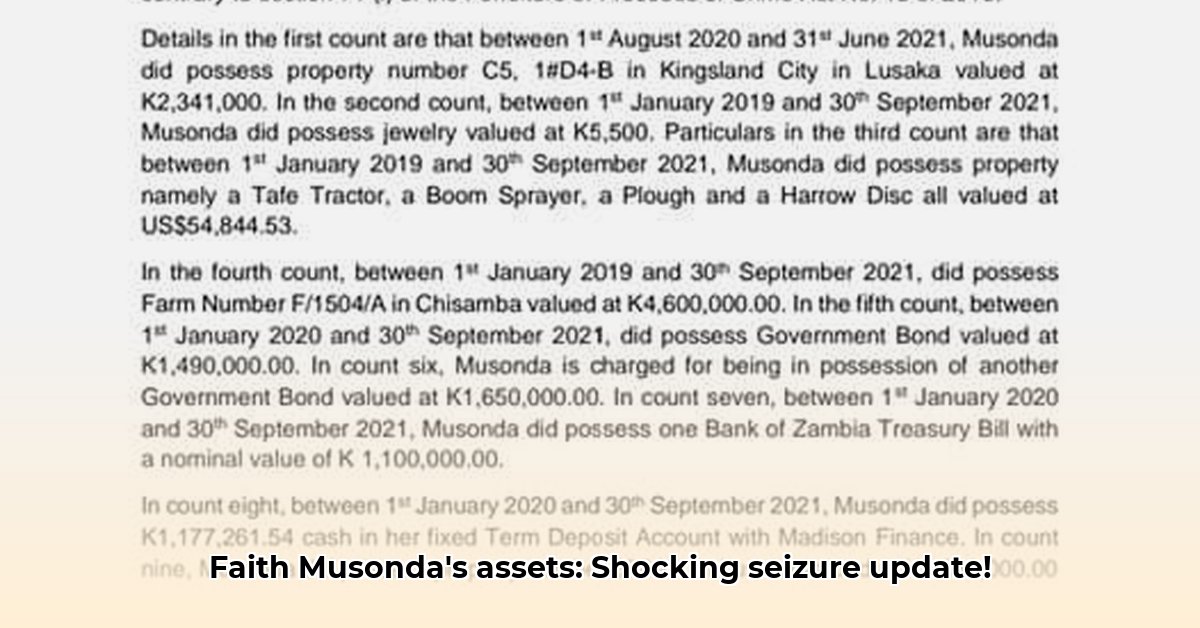
The Faith Musonda case in Zambia has captivated the nation, a complex saga involving allegations of wrongdoing and the seizure of substantial assets. Millions of Kwacha, numerous vehicles, and several properties are at the centre of this high-profile case, raising crucial questions about Zambia's fight against corruption and the fairness of its legal processes. This in-depth report examines the unfolding events, the challenges faced, and the path forward.
Unfolding Events: A Timeline of the Case
The initial charges against Ms Musonda focused on specific properties. However, the case has dramatically expanded, now encompassing fifteen counts involving a significant sum of money and a large number of vehicles. This escalation suggests investigators may have uncovered a broader network of alleged corruption. But is this a sign of a major breakthrough or a widening of the net to strengthen a potentially weaker case? This question remains central to the ongoing debate.
Adding another layer of complexity, Ms Musonda's defense team alleges that the charges are politically motivated, a claim that casts a shadow over the proceedings. This raises serious concerns about whether the legal process is being fairly applied or if political agendas are influencing the case. This allegation demands thorough investigation and unbiased scrutiny.
Fighting Corruption: Challenges and Weaknesses
The Musonda case highlights Zambia's struggles in tackling high-profile corruption cases. The lengthy legal process and the evolving nature of the charges raise concerns about the effectiveness of the investigative process. Some legal experts suggest that current Zambian laws may be inadequate for handling complex financial crimes of this magnitude. Others point to potential resource limitations and a lack of specialized skills within the investigative teams.
A significant concern revolves around the capacity of investigators to trace complex financial transactions. The scale of the alleged crimes suggests sophisticated methods may have been used, necessitating advanced investigative techniques that current resources may not readily support. Ongoing research aims to address these resource and capacity gaps.
Moving Forward: Strengthening Systems and Rebuilding Trust
Addressing corruption effectively requires significant reform within Zambia’s legal and investigative systems. The Musonda case offers a valuable lesson, pointing to areas requiring immediate attention. Strengthening the Anti-Corruption Commission (ACC) is paramount. This involves increased funding, improved data management systems, and enhanced collaboration between government agencies. Simultaneously, strengthening the judiciary is crucial. Faster, fairer trials and greater transparency are vital to rebuild public trust. Ultimately, the Zambian government's commitment to tackling corruption must be demonstrably evident, fostering a culture where honesty and transparency prevail and no one is above the law.
The Role of Civil Society
Civil society organisations (CSOs) play a critical role in overseeing the legal process, advocating for legal reforms, and educating the public about the dangers of corruption. Their ongoing monitoring and advocacy are vital checks and balances in upholding accountability. Their efforts in fighting for justice and transparency are indispensable.
Actionable Steps: A Call for Change
The following table outlines actionable steps for key stakeholders, outlining both short-term and long-term objectives:
| Stakeholder | Short-Term Actions | Long-Term Actions |
|---|---|---|
| Anti-Corruption Commission (ACC) | Improve data management; enhance inter-agency cooperation | Establish specialized units for complex financial crimes; refine asset recovery processes |
| Zambian Judiciary | Ensure swifter, fairer trials; increase transparency | Develop specialized courts; provide advanced training in financial crime investigation |
| Zambian Government | Increase ACC funding; introduce stricter anti-money laundering laws | Strengthen institutions; promote accountability; enhance international collaboration |
| Civil Society Organizations | Monitor court proceedings; advocate for legal reforms | Conduct independent research; public education campaigns; strengthen organisational capacity |
Assessing the Risks: Potential Roadblocks
This risk assessment matrix highlights potential challenges and mitigation strategies:
| Factor | Risk Level | Potential Impact | Mitigation Strategies |
|---|---|---|---|
| ACC Investigative Capacity | Medium | Inefficient investigations; weak cases | Increased funding; enhanced training; strengthened inter-agency cooperation |
| Judicial System Efficiency | Medium | Delays in prosecution; potential for impunity | Specialized courts; streamlined case management; improved judicial training |
| Political Interference | High | Unfairness; erosion of public trust | Strengthening institutional independence; promoting transparency; independent oversight |
| Public Trust | High | Erosion of public trust; potential for social unrest | Transparent and efficient processes; clear and consistent communication |
The Faith Musonda case serves as a critical examination of Zambia's fight against corruption. Its outcome will profoundly impact public perception and future anti-corruption efforts. The path forward necessitates stronger institutions, improved legal frameworks, and an unwavering commitment to transparency and accountability. Only then can true justice prevail.